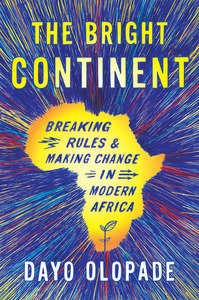Take a photo of a barcode or cover
21 reviews for:
The Bright Continent: Breaking Rules and Making Change in Modern Africa
Dayo Olopade
21 reviews for:
The Bright Continent: Breaking Rules and Making Change in Modern Africa
Dayo Olopade
A very enjoyable book. Good to read positive stuff about Africa, but it also didn't shy away from the problems the continent is facing. I don't see eye to eye with the author on everything, but it was good to see a different perspective.
informative
This was a really fascinating read and definitely one I learnt a lot from. I didn't end up necessarily agreeing with all of the author's points, some of which veered into being a bit too neoliberal and pro-capitalism (though having said that, it was still interesting seeing this ideology coming across from an African rather than a western perspective). It's also certainly well-written, with a good structure and compelling smaller and wider arguments.
Moderate: Death, Genocide
informative
reflective
medium-paced
A great perspective on lean economies through the eyes of many African countries. Especially reflective on the misconceptions fat economies have of these nations and how it misguides our charity. Since the book was published in 2014 I am curious to learn how some of the information has changed
It may be easy to read this book as a libertarian celebration of hustling, hacking, and free-form development in sub-Saharan Africa. And it is. (page 232)
Last summer, at 4 AM on an overnight layover, I struck up a conversation with a French-South African woman, a choreographer, also stuck in the aeroport. We didn't have all that much in common, but it was a pretty awesome (technical term) conversation -- scattered, wide-ranging. Politics and dance and Justin Bieber and food banks and diversity.
This book reminds me of that -- not the people so much (I've never met the author and only spent a few hours with the choreographer; they're both connected to multiple cultures, but as far as I know, the similarities end there), but the fascinating-scattered feel. You know that sense, when you read something, that the author has all this knowledge and all this passion and if you sat down and had a conversation, you'd leave with your head bursting with new things and it would be a highlight of your month? Yeah. That.
I say 'scattered' for a reason -- there are a ton of ideas and anecdotes in here. Some of them could be developed into books of their own. (Some of them probably have been.) The author's a journalist who's had the opportunity to see a lot and travel a lot; she sees a great deal more hope and possibility in sub-Saharan Africa than many other writers. She talks here about the things that are working -- often in the shadow of, and because of, those that aren't.
It's interesting to consider how some of the things that she describes as working would be viewed elsewhere: the Bridge school model, for example (pages 131-134) -- which basically works because Bridge teachers are told exactly what to teach and how to teach it -- would be decried elsewhere because it limits individual teachers' creativity, etc., etc. But in Kenya it's a positive thing because many kids' other options are much worse, and because Bridge takes the uncertainty out of teaching. She also points out some (perhaps controversial) criticisms of concepts such as microfinance -- which, done right, can improve situations, but by how much?
Sometimes it's the briefest mentions that pique my interest: in this case Makoko, which I'd never heard of. (Kibera, yes, but not Makoko, a slum in Lagos consisting of buildings on stilts in a lagoon.) Or the age differences between heads of state and the average citizen -- in Europe and North America, the average political leader is 55 and the median age of the public 39; in sub-Saharan Africa, the numbers are 62 and 19. (Okay, I might not read a book about politicians and ages. But I'd love to know more about Makoko.)
Olopade points to that which works, much of which is on a smaller scale than you see in, say, [b:Dead Aid|7090761|Dead Aid Why Aid Is Not Working and How There Is a Better Way for Africa|Dambisa Moyo|https://d202m5krfqbpi5.cloudfront.net/books/1316635738s/7090761.jpg|6364466] (sorry -- comparisons are inevitable, and anyway I just read Dead Aid). These solutions can't touch a number of problems on a broader scale, but it's a very interesting run through patchwork problem-solving.
I received a free copy of this book via a Goodreads giveaway.
Last summer, at 4 AM on an overnight layover, I struck up a conversation with a French-South African woman, a choreographer, also stuck in the aeroport. We didn't have all that much in common, but it was a pretty awesome (technical term) conversation -- scattered, wide-ranging. Politics and dance and Justin Bieber and food banks and diversity.
This book reminds me of that -- not the people so much (I've never met the author and only spent a few hours with the choreographer; they're both connected to multiple cultures, but as far as I know, the similarities end there), but the fascinating-scattered feel. You know that sense, when you read something, that the author has all this knowledge and all this passion and if you sat down and had a conversation, you'd leave with your head bursting with new things and it would be a highlight of your month? Yeah. That.
I say 'scattered' for a reason -- there are a ton of ideas and anecdotes in here. Some of them could be developed into books of their own. (Some of them probably have been.) The author's a journalist who's had the opportunity to see a lot and travel a lot; she sees a great deal more hope and possibility in sub-Saharan Africa than many other writers. She talks here about the things that are working -- often in the shadow of, and because of, those that aren't.
It's interesting to consider how some of the things that she describes as working would be viewed elsewhere: the Bridge school model, for example (pages 131-134) -- which basically works because Bridge teachers are told exactly what to teach and how to teach it -- would be decried elsewhere because it limits individual teachers' creativity, etc., etc. But in Kenya it's a positive thing because many kids' other options are much worse, and because Bridge takes the uncertainty out of teaching. She also points out some (perhaps controversial) criticisms of concepts such as microfinance -- which, done right, can improve situations, but by how much?
Sometimes it's the briefest mentions that pique my interest: in this case Makoko, which I'd never heard of. (Kibera, yes, but not Makoko, a slum in Lagos consisting of buildings on stilts in a lagoon.) Or the age differences between heads of state and the average citizen -- in Europe and North America, the average political leader is 55 and the median age of the public 39; in sub-Saharan Africa, the numbers are 62 and 19. (Okay, I might not read a book about politicians and ages. But I'd love to know more about Makoko.)
Olopade points to that which works, much of which is on a smaller scale than you see in, say, [b:Dead Aid|7090761|Dead Aid Why Aid Is Not Working and How There Is a Better Way for Africa|Dambisa Moyo|https://d202m5krfqbpi5.cloudfront.net/books/1316635738s/7090761.jpg|6364466] (sorry -- comparisons are inevitable, and anyway I just read Dead Aid). These solutions can't touch a number of problems on a broader scale, but it's a very interesting run through patchwork problem-solving.
I received a free copy of this book via a Goodreads giveaway.
I though Dayo Olopade's overarching narrative of changemakers in Africa was powerful and an important way of looking at the future of the continent. As such, I think it's a good read for anyone working/interested in international development.
However, a friend pointed out that she uses largely once-off examples to make her point and I found that to really be true. It's not a strong data-driven approach to the arguments she is making, but more a compilation of case studies.
However, a friend pointed out that she uses largely once-off examples to make her point and I found that to really be true. It's not a strong data-driven approach to the arguments she is making, but more a compilation of case studies.
informative
inspiring
This book is optimistic, for sure. Olopade paints a much “brighter” picture of Africa than what you’ll often read elsewhere. She doesn’t exactly avoid discussing the difficulties faced in Africa, but she always follows that discussion with some examples of people innovating in incredibly creative ways to overcome these challenges. Very well worth the read if for no other reason than to make us reconsider what passes as “innovation” in the west.
Olopade reports any number of fascinating, hopeful stories of Africans trying new ways to improve their lives and their communities. What irritated me was the thick layer of neoliberal ideology on everything, including regular disparagement of the very concept of public provision of public goods like education and health care. There's a case to be made, and libertarians would surely make it, that what she calls "fail states"—inefficient, self-dealing, and yet perversely legitimated by their peers—are more the norm than the exception worldwide. Heck, there's a case to be made that every state in postcolonial Africa is an illegitimate product of empire, open to replacement in practice by other kinds of local or regional networks for security and services. If she had really committed to making those arguments I'd mind less. Instead, they just sort of hovered in the back of her rhetoric, where she couldn't be held accountable to any of their full implications.
This is why I don't watch TED talks. Give me actual theory or history, with real ideas, that I can argue with, rather than this sort of deliberately empty would-be inspiration.
This is why I don't watch TED talks. Give me actual theory or history, with real ideas, that I can argue with, rather than this sort of deliberately empty would-be inspiration.
This book was simultaneously the best and worst book to read after spending a year working in development. "A libertarian celebration of hustling, hacking, and free-form development in sub Saharan Africa," also known as 'kanju' it showed me the status quo I am stuck in but inspired me and opened my eyes to new ways of thinking. Smooth, interesting, and intensely readable (except for maybe that last chapter which seemed a bit smooshed and scattered).
Note: This was a Goodreads giveaway so everything I say can be used against me.
Note: This was a Goodreads giveaway so everything I say can be used against me.
I have definite ideological differences with the author, and the one thing that kept this book from being 5-star great, for me, was the glossing over of some points that didn't mesh with her overall political thesis, which is pretty libertarian. But regardless of that, this was an incredibly well-written, educational and thought-provoking book, and the less political take-home point of the book, that Africa is better looked at internationally and from within in terms of its potential rather than its shortcomings, is important and well made.




